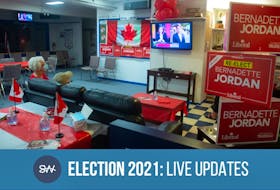Five accomplished female candidates spent a Wednesday night in Ottawa Centre debating policy before a room packed with several hundred constituents.
While every candidate was quick to criticize the others on campaign proposals or their party’s record, personal jabs were absent. The crowd at the Glebe Community Centre was less reserved — heckling and applauding throughout the debate’s two hours.
Ottawa Centre comprises much of city’s urban core. Its constituents have alternated between electing New Democrat and Liberal members of Parliament since the riding’s creation in 1966 (save for one byelection in 1978 when the Progressive Conservatives took the seat.)
After three election wins, the NDP’s Paul Dewar lost Ottawa Centre to then-rookie Liberal Catherine McKenna in 2015.
In McKenna’s opening remarks, she put the focus on her own record in the riding:
“You guys took a chance on me,” she said. “We’ve done a lot of amazing things together.”
And on climate change specifically — a cornerstone of her portfolio as environment minister over the past four years — McKenna warned of the consequences of cutting loose the Liberals before they can finish what they’ve started. “We cannot afford to go back in time. We need to continue the hard work.”
The debate saw criticism of the Liberal record from McKenna’s left and right.
NDP candidate Emilie Taman raised the spectre of the Trans-Mountain pipeline: “One of the biggest acts of hypocrisy I’ve seen out of our current government was declaring a climate emergency one day, and approving a pipeline the next.”
Conservative candidate Carol Clemenhagen focused on the Liberals’ failure to balance the budget: “With debt and deficits at the current level, my concern is that we’re not going to have the room to make investments in health care.”
When faced with criticism, McKenna was steadfast in her defence of party policies over the past four years.
On the subject of affordability, she said, “We did something that was really hard. We raised taxes on the one per cent — probably some of you in this room — so we could lower them on the middle class.”
Every candidate had standout moments, particularly when it came to subject areas they had professional experience in.
Green party candidate Angela Keller-Herzog, an economist and small business owner, made the case for voting green in Ottawa Centre while acknowledging her party isn’t likely to form government this election.
“ I can follow the money and hold them accountable for spending wisely,” she said. “With only a few more Greens in Parliament through progressive ridings like Ottawa Centre, we could have an enormous impact.”
Taman, a former federal Crown prosecutor, said she’s seen “the harms that criminalization causes,” and made the case for decriminalizing illicit drugs and looking at providing a safe supply.
“it’s the only way that we’re going to prevent these deaths. I know it’s uncomfortable for a lot of people, but if we’re going to treat this as the health crisis that it is, that’s an absolutely necessary step.”
Clemenhagen, a health care executive who served as the first female president and chief executive of the Canadian Hospital Association, appeared particularly confident when discussing health care. Arguing against universal pharmacare, she pointed out the challenges already associated with finding a family doctor or securing placement in long-term care.
“The health system is under constraint. My concern, when we talk about a universal pharmacare program, is that we’re setting ourselves up to have different elements in an already-stressed health system competing for economic resources.”
On several occasions, People’s party candidate Merylee Sevilla, a public servant and LGBTQ advocate, made contributions to the debate that did not go over well with the audience. Her denial of the climate crisis was met with loud booing. However, she won applause when she suggested investing foreign aid money into Indigenous communities in Canada, instead.
McKenna, who worked as a lawyer before entering politics and taught at the University of Toronto’s Munk School of Global Affairs, closed the debate by praising its all-female slate and respectful discourse.
“In this world we could use a little more civil debate.”
Copyright Postmedia Network Inc., 2019

